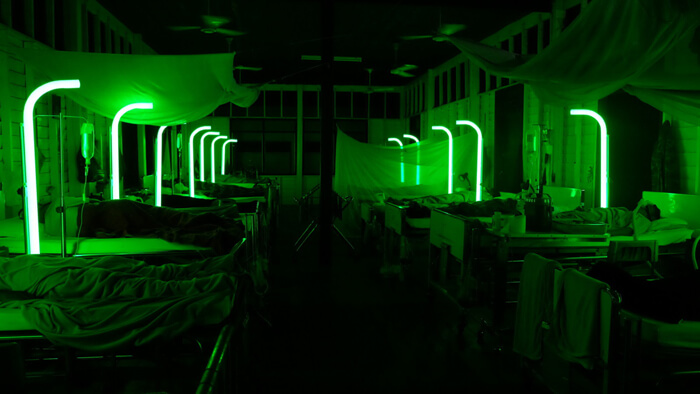NYFF 2015: Apichatpong Weerasethakul’s Cemetery of Splendor
Cemetery of Splendor screens at 9pm on Wednesday, September 30 and Thursday, October 1 in the main slate of the 53rd New York Film Festival. Strand Releasing will distribute the film theatrically in the US.
Cemetery of Splendor, the latest film by Thai director Apichatpong Weerasethakul, takes place mostly in a current hospital/former school. That may not necessarily sound like a depressing environment, but this hospital’s patients are mostly soldiers and are borderline comatose, their souls leeched into a parallel universe to wage war for dead, nameless kings.
For the uninitiated, that sentence may be a little strange, but to those familiar with Apichatpong’s work, particularly 2010’s Uncle Boonmee Who Can Recall His Past Lives, it’s a natural point of progression. For Apichatpong, the mythological past often fades into the present; in Cemetery, it happens with the soldiers and in the form of ancient goddesses materializing as real women. When characters take a walk through the “past,” describing gold and riches, the camera presents to the audience only the present incarnation of that land.
With the contextual backdrop of the 2014 Thai military coup, it is difficult not to see the repurposing of a school to a hospital as a shift from a nation in progress to one in perpetual need of repair. Even so, it is hard to think of a director of Apichatpong’s caliber who matches his optimism. Accordingly, throughout Cemetery a bulldozer is seen on a nearby lot. If this were, say, a Michelangelo Antonioni film, that might represent the dehumanized and “alienating” lifestyle that modernity entails; For Apichatpong, though, it is a symbol of development.
When the camera shows grass, trees, and benches while a spiritually-possessed woman describes long-lost splendors, Apichatpong is highlighting the role memory plays in the formation of history, especially following trauma. This, and his propensity for long, still takes makes him similar to Taiwan’s Hou Hsiao-hsien. Hou, however, is more concerned with the nature of representation, and politics are the raison d’être for many of his films. Apichatpong borrows more from the avant-garde than Hou; questions of illusion, dreams, and temporal unity reign supreme. Apichatpong’s unique breed of not-quite Magical Realism, then, enables his politics, rather than vice-versa. Even so, those who have trouble with Apichatpong’s unusual formalism can grasp something more tangible this time around.
You might also like 





















